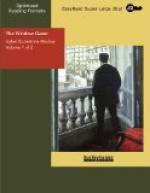“I don’t care what you do.” (She was almost sobbing in her anger.) “I don’t understand you. . . . I don’t want to. . . . But you’re not going to get away with it . . . that cool air of yours . . . pretending not to see. . . . If you are human at all you’ll see . . . and remember all your life.”
They were close to the library window now. Desire looked in.
She looked so long and stood so still that Mary had time to get back a little of her breath and something of her common sense. An instinct which her selfish life had pretty well buried began to stir.
“Come away,” she whispered, “I shouldn’t have . . . it wasn’t fair . . . he would never forgive us if he knew we had seen him like this!”
Desire drew back instantly.
“No,” she said. Her voice was toneless. Her face in the darkness gleamed wedge-shaped and unfamiliar between the falling waves of her hair.
“I’m sorry,” said Mary sulkily. “But I thought you ought to know what you are doing. It takes a lot to break up a man like that.”
“Yes,” said Desire. “All the same I had no right—”
“You will have,” said Desire evenly.
They were at her door now. She paused with her hand on the knob.
“I knew he cared,” she said in the same level voice, “but I didn’t know that he cared like that.”
“You know now,” said Mary. Her irritation was returning.
“Yes,” said Desire. “Good-night.”
She opened the door and went in.
CHAPTER XXXIV
It seems incredible and yet it is a fact that Bainbridge never knew that young Mrs. Spence had run away. Full credit for this must be given to Miss Caroline Campion, who never really believed it herself—a mental limitation which lent the necessary air of unemphasized truth to her statement that Desire had been summoned suddenly to her father.
Miss Campion had, in her own mind, built up an imaginary Dr. Farr in every way suited to be the father-in-law of a Spence. This creation she passed on to Bainbridge as Desire’s father. “Such a fine old gentleman,” she would say. “And so devoted to his only daughter. Quite a recluse, though, my nephew tells me. And not at all strong.” This idea of delicacy, which Miss Campion had added to the picture from a sense of the fitness of things, proved useful now. An only daughter may be summoned to attend a delicate father at a moment’s notice, without unduly straining credulity.
One feels almost sorry for Bainbridge. It would have enjoyed the truth so much!
“Is Desire going to have no breakfast at all?” asked Aunt Caroline, from behind the coffee-urn on the morning following the garden-party. It was an invariable custom of hers to pretend that her nephew was fully conversant with his wife’s intentions.
“She may be tired,” said Benis.
“No. She has been up some time. The door of her room was open when I came down.”




